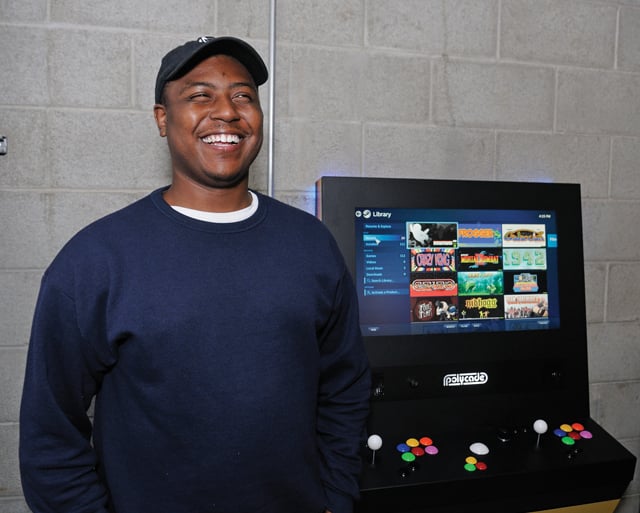PlayVS Inc. co-founder and Chief Executive Delane Parnell has come a long way from Detroit’s Jeffries Housing Projects.
After a tenure in the venture capital industry, he coupled that experience with a passion for sports to take over PlayVS, a software company that provides a league infrastructure for e-sports in high schools in roughly 20 states. Parnell and his backers are launching their inaugural season this September, bolstered by an affiliation with the National Federation of High Schools and $15.5 million in funding from Santa Monica-based Science, an investor that also is incubating PlayVS, along with Venice-based CrossCut Ventures Management, and the San Francisco 49ers professional football team. Parnell spoke with the Business Journal’s Samson Amore from PlayVS’s offices in Santa Monica about why high schools are its target market and his company’s plans for tapping into it. Edited excerpts of the interview follow.
Question: What drew you to this area of technology?
Answer: When I was in high school, I was in a gaming club, and won a championship in Madden 2010 (a football video game). My science teacher would keep track of stats and standings, and had a playoff system. The opportunity (now) to be able to impact what I would categorize as a frontier sport is appealing to me, considering it’s something that I wish existed when I was a kid.
It sounds like you had your own version of an e-sport with that teacher?
Certainly. He had a single-school infrastructure for this and it was amazing. I didn’t notice that until my brother told me last fall, “You’re building exactly what you used to do in high school.”
Why help high schools establish an e-sports program?
High school has been the catalyst for growth for all sports, and with e-sports historically the best players in high school. It makes no sense that high school kids can’t have organized play. We wanted to verify that the people you’re playing with are in high school, your teams will be on campus with other high schoolers within your school, and you’ll be able to be varsity and win a state championship.
What made you look at high schools?
The e-sports scene is starting to professionalize, and in many cases, franchising is also happening. Historically, the best (e-sports) players have been generally in high school or of high school age, but with franchising, it’s an 18-plus age minimum. There’s about 200 colleges across North America that offer scholarships at the varsity level in e-sports. The NCAA (National Collegiate Athletic Association) has put together a team to evaluate e-sports. But those colleges have no formal way to recruit players, and that’s mostly because there’s no organized play for amateurs. E-sports competitors are just playing in grassroots competitions with no governance from the NCAA, and not in a season where they can develop as a player.
How does PlayVS make money?
Participation fees. (When our league starts), players’ parents will pay us $64 (per player), per season, which is the equivalent of $16 per month for their kid to participate in e-sports. Most of the time, parents will cover fees, but some schools may cover participation fees. In high school sports, parents are spending close to $400 per kid, per sport, per season — just to participate. That’s not even including the cost of equipment or the traditional fees associated with a traditional sport or activity in high school. An (e-sport) season is four months, happens twice every school year and we’ll run something in the summer, when the costs might vary.
What role does Los Angeles play in e-sports right now?
Los Angeles is the epicenter of gaming and e-sports. Without L.A., our company doesn’t exist. The talent here is incredible, the game publishers are all near us and we’re able to work with them. Investors recognize this market as a tech hub. especially in industries that are native for this market, like e-sports. I’m excited to be here and hope we can make a difference.
E-sports is moving fast now and there’s a lot of money in it. What industry trends do you notice, and how does PlayVS fit into the picture?
I’m excited about franchised leagues across popular games. I think we’ll see more teams dive deep in the investment of content as well as positioning their brands to be monetized through apparel and other ways outside of sponsorship.
Is e-sports gaining a broader awareness outside of L.A. and young people?
Yes. I was in Chicago and I saw someone wearing an Optic Gaming (an e-sports team based in Dallas) hoodie and I was like, “Wow, that’s insane.” In New York we saw people wearing TSM (Team SoloMid, an e-sports team based in California) gear. E-sports is here, people are excited about these brands, and they’re becoming an everyday part of their life.
You recently announced a collaboration with the National Federation of High Schools, which organizes and oversees high school sports. Can you elaborate on that?
Also, are you pursuing a similar partnership with the California Interscholastic Federation, which oversees athletics at schools in the state?
We closed an exclusive partnership with the NFHS. How it works is the NFHS is the national governing body of all state associations, so every state has one association. They report back to the NFHS, and the NFHS (will) also write the playing rules for e-sports and (will) sanction e-sports. Then, we (will) go out and partner with state associations, which we’ll announce later in August as the first cohort of states to sanction e-sports within their states, and deploy it into their districts and schools. CIF is certainly a group we’ve been talking to; they’re excited about e-sports, and they’ve been amazing to work with.
(A CIF spokesman confirmed the organization has met with PlayVS and other e-sports businesses, but has no formal relationship with any of them at this time).

